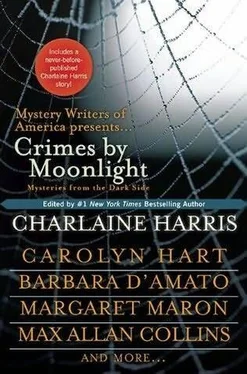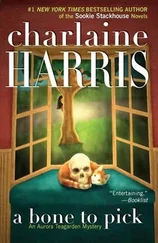COULD Mr. Fong have been the second person in the SUV? Was he the one who cautioned the woman to be careful with me? Our shoplifter?
Dad may not deal in museum-quality antiques, but he does have high standards, and he requires that our dealers meet those standards by frequently refreshing their displays. Some of them rent space in three or four different stores, which means that they’re constantly moving things in and out and that they’re not always clear about what’s where. When we take a customer’s money, we save the tag that was on the item because it has the dealer’s ID number and the asking price. That goes into the till with the customer’s payment, whether cash, check, or plastic, and that’s when a dealer will delete it from his inventory list.
It was Martha Cook, a dealer who’s been with Dad for years, who first noticed that she was missing a small occasional table. Mass-produced, mid-twentieth century, but made of solid mahogany and in beautiful condition. Good value for the $75 Martha was asking.
Then Jimmy Weston reported that a pair of bronze bookends had vanished from his space. “Who the heck steals twenty-dollar bookends?” he asked indignantly.
“A klepto?” wondered Jane Armstead, the part-time clerk who covers for Dad when he’s on a buying trip and I’m in school. “There’s no other logic to what’s being taken.”
Jane’s a divorced freelance artist who’s put on a few pounds over the years. Her long hair is streaked with gray now, and she just coils it around and secures it to the top of her head with hairpins and a couple of ivory chopsticks. Her clothes used to be shabby chic; now they’re just shabby because her commissions have fallen off. Even though she’s worked here off and on since I was in kindergarten, Jane is a little ditzy and no expert in antiques, but she was right about the illogic of the thefts. The only thing Jimmy Weston’s bronze bookends had in common with a trio of 1930s lead soldiers, a chipped Art Deco vase, and a pair of Kendall Loring’s silver-plated candlesticks was their portability. Nor were they worth much. Except for Martha’s table, nothing was priced at over fifty dollars.
“They took your candlesticks and left the sterling toast rack that was sitting right beside it?” said Jane. “Weird.”
“Indeed,” Ms. Loring said crisply. “Especially since the toast rack is Georgian and worth five times the candlesticks.”
Dad started listing the Chinese things on eBay in the middle of January, three new dealers joined the store in February, and the shop-lifting began soon after that.
IT has to be one of those three, I think as my eyes adjust to the darkness. Is it coincidence, or did they suddenly show up because they saw those Chinese things on eBay and thought they could come clean us out? I see a paper-thin line of light where the door doesn’t fit the sill completely. No real help. There’s nothing I can change into that would let me move through such a narrow opening. As the March chill penetrates my prison, I move farther away from the cold metal roll-up door and fumble around till I find a second padded blanket to insulate me from the concrete floor while I think about those new dealers.
Thomas Fong is from San Francisco. Late forties. Married, though we’ve never seen his wife. With that name, you’d expect someone small, dark, and inscrutable. You’d be wrong. He’s tall, blue-eyed, and four generations removed from the mainland, but his Chinese roots led him to an appreciation of classical Chinese antiques, and he specializes in decorative pieces of Asian origin. “Unfortunately, they’re mostly things that were made for export and not very old,” he told me. “Post- 1945.” Very nosy. Forever trying to get a look inside the storage room. Even though he’s not there every day, he always seems to be around when I photograph a new batch of items.
Next comes Kendall Loring from Detroit. Mid-thirties. Still single. Skinny. Brown hair that’s curlier than mine, and she’s even nosier than Mr. Fong. First day in the door, she’s asking questions about school and who my friends are and what my mom was like and if I think Dad will ever get married again. Sort of cute, but way too young for Dad. If I were on Facebook, she’d probably be banging at the electronic door begging to be my friend. Says she doesn’t like Chinese arts and deals only in estate jewelry and silver. Could she have been the second person in the van? Maybe her candlesticks weren’t really stolen. Maybe that was to keep us from suspecting her when other things disappeared.
Last is a youngish widow from New York City. Neva Earle. Forty and fighting it. Friendly enough, but more reserved than either Fong or Loring. Her space is an eclectic mix of porcelain and ceramics, everything from Staffordshire dogs to beautiful Dresden plates. Would she-Omigod, what’s that noise?
It sounds almost like someone’s touching a sheet of bubble wrap. Mice? Rats? I squint through the gloom, but it’s too dark to see anything distinctly. I flounce my blanket to flush whatever creature it is and to get a fix on its location, but all is silent again. “Nerves,” I mutter to myself. Eventually I relax and go back to analyzing the situation.
DESPITE all our care in watching our customers like a hawk, occasional small items continued to walk off. Jane started asking customers to leave their tote bags at the front counter when she was covering the store for Dad, but he couldn’t bring himself to do it.
“It’ll look like we don’t trust them,” he said.
“We don’t,” Jane and I chorused.
Things finally came to a head last week. My fault. We keep the storeroom locked, of course, but once an item’s been listed online, I’m not as careful as I should be about putting it back under lock and key. When Dad went to crate up a lacquered chest that had sold for well over its $2000 reserve, it was gone. I had covered it with an old patchwork quilt and left it on the floor beside the table I use as a staging platform for my camera. Instead of the Chinese chest, the patchwork quilt covered a plain oak chest of our own that was worth only a fraction of the other.
The police came and poked around, but what could they do? No door had been forced, and taking fingerprints in such a public place would have been useless. “We’ll file an incident report so you can put in an insurance claim,” they told Dad, “but you might want to change your locks. Looks like an inside job by someone with a key.”
“Well, that’s stupid,” I told Dad when they were gone. “You and Jane have the only keys, and Jane hasn’t been in since I left the chest out.”
“Of course, it wasn’t Jane,” said Dad. “I hate to say it, but I’m afraid it must be one of the new people. All three of them restocked their booths this week, so they were back and forth with dollies. If you could remember when you last saw the chest-?”
But I couldn’t. This was Thursday. I knew it was there last Saturday morning because a customer had been interested in the quilt until she realized that one end of it had been damaged in a fire, but the chest could have been taken twenty minutes later, and who would notice?
Dad was due to be out of town all weekend for an antique fair. I had finally convinced him that I was old enough to stay home alone, but as soon as he left Friday morning, I ditched school and headed for the shop.
Jane was behind the counter and surprised to see me. “No school?”
“Teacher workday,” I said glibly. “I’m going to take pictures of another box of stuff in the storeroom.”
No sooner had I unlocked the door and switched on the light inside than Mr. Fong was right there at my elbow. He insisted on helping me carry things out to my tabletop photography studio. This time, I didn’t discourage him. He wasn’t particularly interested in a tall ceramic statue of a goddess-“Early twentieth century, made for export and a dime a dozen,” he said dismissively-but a Ming dynasty vase with a scaly blue dragon prancing around the flared bowl really made him salivate.
Читать дальше












